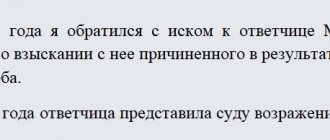Would you like to consult a lawyer for free? Write to the chat on the bottom right or call the hotline, calls within the Russian Federation are free. We accept questions any day of the week.
To resolve civil disputes, interested parties file claims with the courts. However, there are cases when the lawsuit is actually filed by a person whose rights have not actually been violated. What does the court do in this case, who is an improper plaintiff in civil proceedings, is it possible to replace him in the case?
The concept of improper plaintiff
An improper plaintiff is a citizen who does not actually protect his own interests and has no legal grounds to file claims against the defendant in their defense.
The concept of an improper plaintiff is not enshrined in the Code of Civil Procedure of the Russian Federation and other by-laws, Art. 41 of the Code of Civil Procedure of the Russian Federation regulates only the status of an improper defendant.
In legal circles and judicial practice, this concept is found and there is a lot of controversy around it: if at the hearing the defendant declares that the plaintiff is improper, then the judge will understand what is at stake. However, both courts and legal theorists consider this issue from different positions.
Actions of the defendant when filing a claim by an improper person
If the defendant discovers that the claim has been filed by an improper applicant, he should bring this fact to the attention of the court. To do this, he has the right:
- prepare a corresponding petition;
- state your objections to the claim;
- issue a written statement about the factual circumstances of the case or disclose them orally.
If the defendant simply waits for the court to make a determination that the claim is not subject to consideration, it cannot be ruled out that the judges will not pay attention to important circumstances. As a result, problems may arise if such a claim is successful. Then the defendant will have no choice but to file an appeal.
Acceptance of an application from an improper plaintiff
When citizens file a claim in court, clerks do not have the right to determine whether the plaintiff is inappropriate. The petition must be accepted if the following reasons for its refusal and return, specified in Articles 134-135 of the Code of Civil Procedure of the Russian Federation, are absent:
- the application must be considered in a different order - criminal, administrative, etc.;
- rules of jurisdiction (territorial or instance) were violated;
- the requirements of this claim have already been considered by the court and an appropriate decision has been made;
- the court is already considering a case between the declared participants on the same issue;
- the procedure for pre-trial dispute resolution was not followed;
- the plaintiff is incompetent;
- the application lacks a signature or is signed by an unauthorized person.
Of course, the claim may be left without progress until the inconsistencies are eliminated in some cases, but issues of the legal status of the plaintiff are not one of them.
Civil procedural complicity and its types
Civil procedural participation is the simultaneous participation in civil proceedings of several persons on the side of the plaintiff and/or defendant. These persons are called co-plaintiffs (several persons on the plaintiff's side) and co-defendants (several persons on the defendant's side).
By virtue of Part 2 of Art. 40 of the Code of Civil Procedure of the Russian Federation, procedural complicity is allowed:
- if the subject of the dispute is the common rights or obligations of several plaintiffs or defendants;
- the rights and obligations of several plaintiffs or defendants have the same basis;
- the subject of the dispute is homogeneous rights and obligations.
The features of civil procedural participation are as follows:
- accomplices are subjects of a controversial material and legal relationship;
- the interests of the co-plaintiffs (or co-defendants) do not contradict each other, but are opposed to the interests of the opposite party;
- there is one civil process in which the case is considered with the participation of co-plaintiffs and (or) co-defendants.
Civil procedural complicity may arise at the time of initiation of a civil case if several co-plaintiffs apply to the court or a claim is brought against several co-defendants. The emergence of complicity is possible at later stages:
- the court combines several claims pending in the proceedings of this court, in accordance with Art. 151 Code of Civil Procedure of the Russian Federation. Complicity arises after the determination;
- an accomplice may enter into the commenced civil proceedings. For a co-defendant to join the process, his consent is not required. If it is impossible to consider the case without the participation of the co-defendant (co-defendants), due to the nature of the controversial legal relationship, the court invites him (them) to participate in the case on its own initiative. After the involvement of a co-defendant (co-defendants), preparation and consideration of the case are carried out from the very beginning (Part 3 of Article 40 of the Code of Civil Procedure of the Russian Federation).
The co-plaintiff enters into the process of his own free will. This demonstrates the principle of dispositivity. If the court believes that the rights protected by the plaintiff belong to some other persons, then it informs potential plaintiffs of their right to appeal to the court.
Types of civil procedural complicity are distinguished depending on the compulsory nature of complicity, the legal status of the accomplices, etc. Depending on which side the accomplice is on, civil procedural complicity is divided: 1) into active (there are several accomplices on the plaintiff’s side); 2) passive (there are several accomplices on the defendant’s side); 3) mixed (there are several persons on both the plaintiff’s side and the defendant’s side).
Depending on the obligation to attract accomplices, civil procedural participation can be mandatory (necessary) and optional.
Mandatory (necessary) complicity is complicity that arises by virtue of the law, the nature of the disputed material legal relationship and does not depend on the discretion of the court or the persons involved in the case. Consideration of the case in the absence of at least one of the accomplices is impossible, as it can lead to the adoption of an unjust judicial act.
The meaning of the legislation implies the need to attract accomplices. For example, from Art. 69 of the Housing Code of the Russian Federation it follows that family members of the tenant of a residential premises under a social tenancy agreement have equal rights and obligations with the tenant. Consequently, in disputes about the division of housing, exchange of living quarters, etc. It is necessary to involve all adult family members of the employer living with him in the consideration of the case.
Mandatory participation arises in cases of common property, inheritance, claims for the exclusion of property from the inventory, for the protection of honor and dignity, for the right to use residential premises, etc.
The basis for compulsory complicity can be the nature of the object of the dispute: the consideration of a case on the right of ownership, the right of inheritance of one person depends on the establishment of the rights of other persons to the same object, which determines the presence of compulsory complicity in such cases.
Mandatory complicity concerns co-defendants, whom the court is obliged to involve in the consideration of the case. If complicity on the plaintiff’s side is necessary, the court does not have the right to forcibly involve co-plaintiffs in the process.
Optional complicity is complicity that arises at the discretion of the court. In this case, the cases of the accomplices can be heard separately, which will not affect the legality of the conclusion reached by the court.
The procedural basis for combining cases is the provision of Part 4 of Art. 151 of the Code of Civil Procedure of the Russian Federation, according to which the judge, having established that in the proceedings of this court there are several similar cases in which the same parties are involved, or several cases on claims of one plaintiff against different defendants or different plaintiffs against one defendant, taking into account the opinions of the parties has the right to combine these cases into one proceeding for joint consideration and resolution, if he recognizes that such a merger will contribute to the correct and timely consideration and resolution of the case.
Therefore, for the application of Art. 151 of the Code of Civil Procedure of the Russian Federation it is necessary to establish:
1) homogeneity of cases being processed by the court. Typically, the homogeneity of cases is determined by the similar subject of the claim (reinstatement at work, etc.), the basis of the claim (a single reason for the dismissal of several persons - staff reduction, etc.), which ultimately determines the range of circumstances that make up the subject of proof in the case. For example, the claim will not be homogeneous if one plaintiff asks to be reinstated due to illegal dismissal, and another asks to compensate for the damage caused to him by the same defendant. Here both the subject and the basis of the claim are different, hence the subject of proof will be different;
2) similarity of the subject composition: the same parties or there are several cases in court proceedings on claims of one plaintiff against different defendants or different plaintiffs against the same defendant;
3) the possibility of combining cases, which will contribute to a more correct and timely consideration and resolution of the case;
4) opinion of the parties.
The substantive and legal basis for the emergence of optional complicity exists in cases of joint infliction of harm. According to paragraph 1 of Art. 323 of the Civil Code of the Russian Federation, in the event of a joint obligation of debtors, the creditor has the right to demand performance both from all debtors jointly and from any of them separately. Thus, the creditor himself determines who to sue, so complicity may arise (sueing all debtors), or may not exist (sueing one of the debtors).
Accomplices enjoy the rights and bear the obligations of the parties to the proceeding. They are subject to general (Article 35 of the Code of Civil Procedure of the Russian Federation) and special (Article 39 of the Code of Civil Procedure of the Russian Federation) rights of the parties. At the same time, accomplices in civil proceedings have additional rights and bear additional responsibilities. Thus, additional rights include the following:
1) according to Part 3 of Art. 40 of the Code of Civil Procedure of the Russian Federation, accomplices may entrust the conduct of the case to one or more of the accomplices;
2) each accomplice acts in the process independently against the other party and is independent in his actions from the accomplices. For example, the plaintiff filed a claim to invalidate the apartment privatization agreement, according to which the defendant privatized the apartment without his consent (the plaintiff and defendant are spouses). The administration of the relevant city acted as a co-defendant in the case. During the hearing, the city administration admitted the claim, but the defendant did not admit the claim.
Controversial issues of refusal to accept a claim
We especially note that clause 1, part 1, art. 134 of the Code of Civil Procedure of the Russian Federation provides that a claim will be refused if it is filed in defense of the interests and freedoms of another person by a citizen who does not have the right to do so established by law, or if the plaintiff challenges acts that do not affect his interests. Challenging acts involves the applicant's claims that his interests are infringed by their content; the defendant in this situation is the authorities and officials.
Having found that the plaintiff is inappropriate (not in cases of appealing acts), the courts sometimes refuse to accept the claim on the basis of the above paragraph, since the plaintiff protects the interests of another person, and not his own.
However, some legal scholars believe that this provision applies more to situations where a certain category of persons, for example, those specified in Articles 44 and 45 of the Code of Civil Procedure of the Russian Federation (prosecutor, guardians, trustees, legal representatives), do not have the right to support claims against other citizens .
Also, even if the rights of the plaintiff are not violated, he still files an application in defense of his own, as he subjectively believes, interests, and not of third parties. Therefore, the use of this part of the article to refuse an improper plaintiff is controversial.
When accepting a claim, the court rarely knows that the plaintiff is not the person whose rights have been violated, and that the defendant indicated in the statement is actually a violator of interests in the dispute. Therefore, often both parties are simply considered in absentia as legitimate subjects of legal relations in civil proceedings, and all issues are resolved during the consideration of the case.
Review of judicial practice
Let's consider what facts and circumstances the courts rely on when deciding to recognize the plaintiff as an improper party to the process. To do this, we will give several real examples in which judicial practice in recent years will be examined.
№ 33-1730/2016
The statement of claim was filed by a person on the basis of a power of attorney. After its acceptance by the court, it was established that the power of attorney does not imply granting the applicant the authority to sign the application and present it in the interests of the Moscow region. This means that the court of first instance did not have legal grounds to accept the claim for consideration. In accordance with the Appeal Ruling of the Sevastopol City Court dated July 14, 2021 in case No. 33-1730/2016, the decision taken on the merits of the case is canceled and the application is not subject to consideration.
No. 41-KG15-37
The claim was filed on behalf of a person who does not have the necessary authority to do so. His representative acted in the interests of the plaintiff on the basis of a power of attorney. The court found that the execution of the power of attorney did not comply with legal requirements. No evidence was presented indicating that the representative had the authority to sign the statement of claim and file it with the court. In connection with the identification of this circumstance on the basis of paragraph. 4 tbsp. 222 of the Code of Civil Procedure of the Russian Federation, the claim to the military registration and enlistment office of the Rostov region for the renewal of pension payments and the transfer of the amount of unreceived pensions in accordance with the Determination of the Supreme Court of the Russian Federation of April 4, 2021 No. 41-KG15-37 cannot be considered.
No. 44g-48/2019
The appeal ruling of the Supreme Court of the Komi Republic in case No. 33-1417/2018 dated April 12, 2021 emphasizes that the court of first instance accepted for consideration an application that was signed by a representative who was not vested with the appropriate authority. At the previous stage of the process, the application was not only accepted, but also considered on its merits. Since a violation of procedural rules has been identified, the decision of the first instance is canceled and the claim remains without consideration.
Replacing Inappropriate Parties
The Code of Civil Procedure of the Russian Federation establishes only the possibility of replacing an improper defendant, therefore, when this status is confirmed by the plaintiff, the following situations are possible:
- The court knows that the original applicant is improper and is a proper plaintiff. If the applicant agrees to withdraw from the dispute, and the real victim wants to participate in it, then the court replaces them with its decision.
- If the improper plaintiff does not agree to withdraw from the case, but the proper one wants to enter to protect his interests, then the judge involves the latter as a third party who will put forward his own claims on the subject of the dispute. In its decision, the court will refuse to satisfy the claims of the improper plaintiff, and will make a fair decision regarding the proper plaintiff based on the materials of the case.
- If the improper applicant wishes to withdraw from the dispute, but the proper one does not make claims or it was not possible to identify him, then the case is terminated on the basis of the applicant’s refusal of the claims.
- When it is not possible to identify the proper applicant or he does not want to enter into a debate, and the improper one insists on his position and does not withdraw from the case, then the court considers the case on the merits and rejects the plaintiff’s claim.
In any case, the judge is not obliged to replace the improper plaintiff, since such a procedure has not been formally established, but may simply refuse to satisfy the claim. At the same time, in all situations, the court does not take into account the defendant’s opinion regarding the involvement of the appropriate victim or the departure of the improper one.
In this case, nothing prevents the defendant from filing a written or oral complaint during the civil process that the applicant is inappropriate. Moreover, it is often these claims, together with the circumstances of the case, that are indicated in the motivation part as the reason for refusing to satisfy the claim.
The arbitration process also does not establish the status of an improper plaintiff and the institution of his replacement; succession in such cases is impossible to carry out, therefore improper applicants are denied their claim.
Involving the Proper Party
Inappropriate participants in legal proceedings are common because at the initial stage, i.e. At the stage of filing a claim, it is impossible for the court to determine exactly whose rights were violated and who actually did not respect them.
The reason is that often material legal relations have a complex structure. What does it mean?
It's simple, many cases that go to court affect many people, and sometimes it is very difficult to determine who suffered and from whom.
The law does not directly call the presence of improper parties in a case an “error.” Rather, these are the costs of legal proceedings. In any case, this is not normal.
For this reason, the law contains a special mechanism to involve the appropriate persons in the case.
Trial
If an improper defendant was involved in the case, then the situation with him is resolved in the simplest way - the court involves the proper person in the case, who must meet the plaintiff’s demands. Moreover, his involvement in the case is carried out exclusively with the consent of the plaintiff, which is not surprising, because it is the plaintiff who is the initiator of the consideration of the case.
If the plaintiff does not agree to replace the defendant, then the court may, with the consent of the plaintiff, involve the appropriate defendant as a co-defendant.
If this does not suit the plaintiff, then the court will not be able to forcefully influence the plaintiff. The judge can only explain to him the consequences of such a decision, although he is not obliged to do this.
If the plaintiff remains unconvinced, the court will continue the proceedings, but in this case the plaintiff will definitely not achieve the desired result. Under no circumstances will the court bring to justice someone who is innocent.
Replacing an inappropriate plaintiff with a proper one is a more complex procedure. More on this below.
Inadequate plaintiff and incapacity
The incapacity of the plaintiff is the inability of citizens, recognized in accordance with the law, to correctly manage their actions and understand their nature in the legal field, to exercise their civil rights and fulfill their duties due to a certain age or illness.
The concepts of “incompetent” and “inappropriate” should not be compared, since an incompetent person is immediately denied a claim, without clarifying the reasons in whose interests it was filed. Legal representatives must go to court on his behalf, and they may be refused to accept the claim on the basis of the above-mentioned article. 134 of the Code of Civil Procedure of the Russian Federation, if it turns out that they do not have the right to act in the interests of the incompetent.
If you need advice, our civil lawyer will help you.
Is it possible to challenge the decision to recognize the applicant as an improper plaintiff?
A court decision to refuse to accept a claim for consideration or to return an application is formalized in the form of a ruling.
It must state the reasons on which the judge relied. Such a determination is made within 5 days from the date the application is submitted to the court. All documents attached to the application are also returned to the person filing the claim. The ruling is served on the interested person in court or sent to his place of residence. If a ruling is made to return the application, the judge must explain in its text the further actions of the unsuccessful plaintiff (indicate how to remove the obstacles that prevent its acceptance).
If the court refuses to accept the application, the person who previously filed it will not be able to bring the same claim again if its grounds remain the same. If the application was returned by the court after its acceptance, the same claim can be brought after the elimination of violations or other obstacles that interfere with this.
The judge's ruling, according to which the application is not accepted for consideration or is returned to the person who submitted it, can be appealed privately.
How to attract a co-defendant
It is possible to involve a co-defendant either on the initiative of the participants in the process or by a court decision.
All participants in the proceedings have the right to submit a petition:
- the plaintiff, when he makes claims against more than one defendant;
- the defendant, when he decides that he alone must bear responsibility;
- third parties related to the case.
Sometimes proceedings are not possible without the participation of other persons. In such cases, the court has grounds to call the necessary participants. Example: involving the insurance company, if a claim is filed bypassing it, directly to the culprit.
In this case, the plaintiff has the first right to attract a co-defendant. Other participants can take advantage of this opportunity after the case is accepted into court proceedings.
It is advisable to involve an additional defendant in writing. The applicant is advised to justify his position in great detail - this will increase his chances that the request will be granted.
Reasons
The grounds for securing a claim are regulated by Art. 139 Code of Civil Procedure of the Russian Federation. Measures are taken if, in case of inaction, there is a risk that the court decision will not be implemented in whole or in part. The process is initiated at the request of the plaintiff.
Measures to secure a claim in civil proceedings are as follows (Article 140 of the Code of Civil Procedure of the Russian Federation):
- seizure of disputed property;
- prohibition on the defendant from performing certain actions;
- suspension of payment under a writ of execution;
- prohibition of actions with disputed property to third parties (for example, registration of rights to it by authorized organizations);
- temporary restriction on the sale of real estate if it is released from seizure (excluded from the inventory).
Legislative acts allow the adoption of other measures to secure a claim in civil proceedings if they correspond to the purposes specified in Art. 139 Code of Civil Procedure of the Russian Federation. The imposition of a ban or restrictions is reported to the responsible organizations, which are obliged to take action. Several measures may be taken to secure a civil claim.
Sources
- Miloslavskaya E. G. Civil law. Part 3, 4. Cheat sheet. 2nd edition. Tutorial; Prospect - M., 1995. - 463 p.
- Belousov Danila Customs law. Crib; Scientific book - M., 2009. - 349 p.
- Alexander Anatolyevich Mokhov Russian business law in tests. Tutorial; Prospect - M., 1988. - 453 p.
- Anatoly Nikolaevich Kuznetsov Criminal procedural acts 2nd ed. Textbook for open source software; Yurayt - M., 2021. - 539 p.
- Andreevsky Sergey Case of Naumov; Mechanical engineering - Moscow, 1986. - 150 p.







